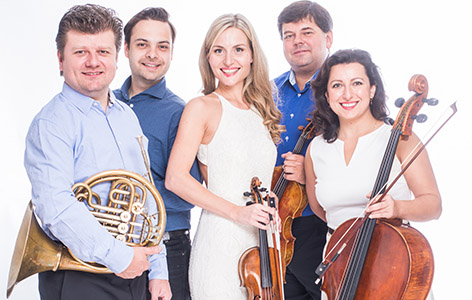| 08. 11. 2021 19:00 p.m. |
| Dům kultury města Ostravy |
| from 200 CZK |

K1 Baborák Ensemble
Wolfgang Amadeus Mozart
Larghetto (KV581), Presto assai (KV 162) for French horn and string quartet
Leone Sinigaglia
Romance op. 3 for French horn and string quartet
Alexander Glazunov
Idylle, Op. 14, Serenade, Op.11 and Rêverie, Op.24 for horn and string quartet
Johannes Brahms
String Quintet No. 2 in G major, Op. 111
Baborák Ensemble:
Milan Al-Ashhab, Martina Bačová – violin
Karel Untermüller – viol
Hana Baboráková – violoncello
Radek Baborák – French horn
The clarinet quintet in A major KV 581 was written for the Viennese clarinetist and bass horn player Anton Stadler, who worked in the court orchestra of the Vienna Burgtheater. The quintet was formed at a time when Mozart was busy composing the opera Così van tutte, and bears all the hallmarks of his mature compositional style. Due to the extraordinary melodic invention, the slow larghett movement of the quintet became especially popular. The final third movement of Presto assai from Mozart’s three-movement Symphony No. 22 in C major KV 162 is an example of the thoroughly positive and joyful music that has become typical for composers.
Sinigaglia is the author of approximately 50 compositions, in which songs, chamber and orchestral works predominate. He was also an avid collector and arranger of folk songs from the Piedmont region. Romance for French Horn and String Quartet, Op. 3 dates from 1889, but was not published until 1902. It is Sinigaglio’s early work filled with romantic melancholy.
Although Glazunov was a remarkable composer, he is overshadowed by his more famous colleagues and his work is neglected by many symphonic orchestras and chamber ensembles. As an excellent French horn player, Glazunov composed a number of great pieces that we included in this program.
Brahms’ String Quintet, Op. 111 is inspired by his travels across Italia. The composer’s contemporaries did not recognize the energetic openness of the piece and one of Brahms’ supporters, the dreaded Vienna music critic Eduard Hanslick, said about the composition: “It seems that Brahms keeps receding into himself and still he gains confidence in the energetic expression of simple feelings…!” The premier in Vienna in 1890 was a sensation.


